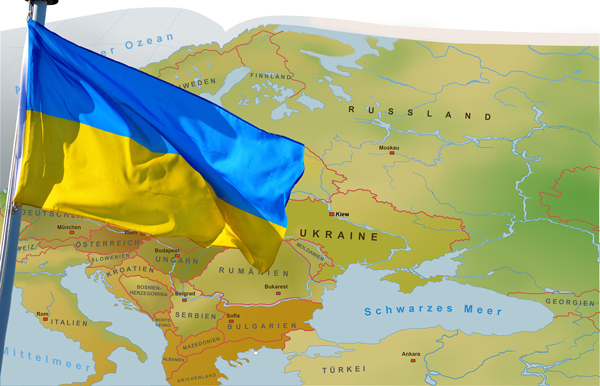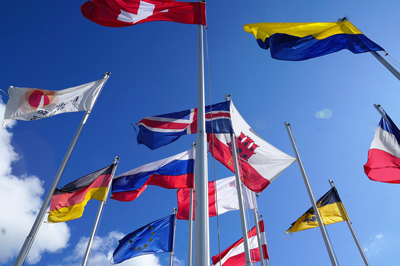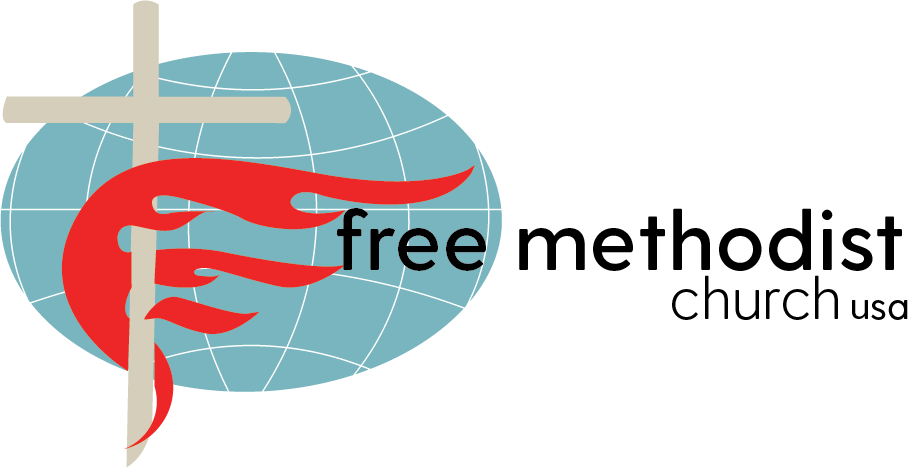Innovative competition between history classes raises more than $650 for Ukrainian relief
Published: June 29, 2022

People in Sri Lanka describe efficiency in terms of knocking fruit out of a tree: “Two mangoes, one stone,” they say.
Greenville University Professor Richard Huston could very well describe the efficiency of an activity he orchestrated in the same way: “Three goals, one challenge.”
This spring, the history professor challenged students in his two largest classes to raise money for Ukrainians suffering from Russia’s invasion. He hoped the exercise would fill multiple purposes:
- Help students relate the current crisis in Europe to lessons they had unpacked throughout the semester.
- Introduce them to a channel for global aid that also has GU connections.
- Meet needs.
A friendly fundraising competition based on Russia’s invasion set the stage for all three. The structure of the competition was relatively simple: Students in the class that raised the most money per student could opt to take an “A” for one “big item” of their choice—a paper or project worth 10 percent of their final grade.
Global events, personal impact

“In World History, the emphasis has been on globalization and the inter-connectedness of countries and world events,” Huston said. Russia’s invasion and the subsequent rise in gas prices here hit home with students. They felt the pinch each time they filled up.
Compassion played a part too for some students like biology education major Levi Siebert. Levi was aware of the conflict’s impact on Ukrainians before the fundraising competition, but the classroom conversation as the “offering” envelope went around increased his knowledge.
“I would consider myself a person who tries to help others when I am able,” he said.
Levi likes a good contest, too. Facing off against students in another class sweetened the deal: “I would definitely say that I am a competitive person, and that I did not want to lose the competition.”
Bishops' Crisis Response Fund
As a Free Methodist who has lived in less developed countries, Huston has long been aware of the FM Church’s Crisis Response Fund.
“When I contemplated which charity to recommend sending the funds to, I thought initially of more recognized international organizations, like Doctors Without Borders,” he said. Ultimately, however, he selected the Bishops’ Fund. He wanted students “to see that GU’s ‘sponsoring’ denomination was active in relief efforts.”

Surprising generosity
The dollar-and-cents results at semester’s end revealed a generous streak in students, at least when it carries the promise of a reward they value.
- The 39 students enrolled in World History raised $13 per student for a total of $519.
- The 20 students enrolled in World Regional Geography raised $7.05 per student for a total of $134.
Huston had the pleasure of sending $653 to the Bishops’ Fund for Ukraine Relief. He also had the pleasure of enjoying surprises along the way, like the “three different occasions, someone—singular or plural, not sure—put $50 in the offering envelope.” he said. “One time it was 50 one-dollar bills.”
Make that four mangoes, one stone
Huston’s fundraising contest accomplished something else that he didn’t intend: It made at least one future teacher aware of a technique for use in another time with another audience. Levi Siebert viewed the whole affair through the lens of his eventual role as a future high school teacher.
“High schoolers are naturally competitive. Competition like this . . . can bring a class together when they are competing against other classes,” he observed.
“Most high school students do not listen to the news enough to fully understand what is going on in the world around them,” he added. An exercise like this—repeated over days, with valuable conversation—“brings a topic to importance that many students might not hear about otherwise.”
Join the effort
If you would like to provide relief to Ukrainians just as the students in Richard Huston’s history classes did, visit this webpage for the Free Methodist Church’s Bishops’ Crisis Response Fund.
